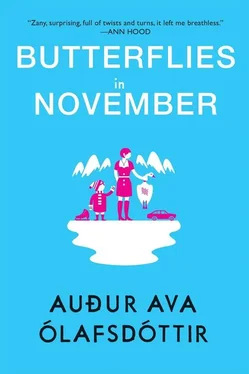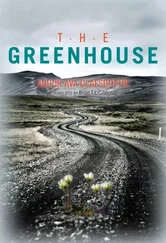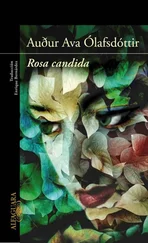He’s holding my washing from the line in his arms and knocks gently on the window. Then he takes off his hood. The parcel is too big to fit into the boy’s boot.
“I have enough time to tell you a long story,” he says.
I loosely brush my fingertips against his black trousers, almost imperceptibly at first, but then stroke him hard enough for him to feel me and then harder again. Next I tackle the white cotton hair, tangling it around my finger to make a skein.
I loosen the buckle of his black belt, slide my hand inside, and pause. His skin is warm; I linger on every pause, concentrating on every detail, and then go searching for a warm mouth and eyes. The nocturnal guest’s imagination knows no limits, although I feel no need to divulge any of that here.
I suddenly hear what sounds like a faint swish and, at the same moment, the candle on the table extinguishes itself, leaving a lingering spiral of smoke. And, as if that wasn’t enough, I see from the total darkness in front of me that the Christmas lights have gone out on the deck. I feel compelled to break the silence and put my visitor’s technical expertise to the test:
“Could you help me with the Christmas lights afterwards?”
He’s quick to solve the problem; they only needed to be switched back on. And he also relights the candle.
“You probably need some earthing,” he says.
“Really?”
“I have to go,” he says, “but I’ll be back.”
As I’m sweeping up the soot from the chimney, along with the other remains of the night, and pick up the clothes scattered around the living room, I look for evidence of his visit and find a tiny stain — sufficient proof to incriminate the right man.
It seems that no one knows exactly where the flooding came from, but understandably it’s the only thing people can talk about in the shop. The village is covered in sand and black sludge, basements are full of puddles, most of the Christmas lights have been smashed to smithereens and garden decorations have been destroyed. Everywhere one goes there are men in orange overalls mopping up, clearing the streets and scooping water out of cellars. The water seems to have flowed down the slope on the eastern side and taken the church with it, although the village itself has been mostly spared.
“We were planning on building a new church anyway,” say the men in a positive spirit; “the old one was just a heap of mouldy trash that we’re happy to get rid of.”
The situation is analogous in the two neighbouring villages. Everyone is flabbergasted; nothing is as it should be. It appears that several rivers in the highlands suddenly broke their banks and started to forge new and unpredictable courses in all directions. The area where the locals used to pick blueberries is now completely inundated. The only thing that doesn’t seem to have changed is that rivers still flow into the sea, albeit not in the places where they are expected to. People are totally puzzled by the freakish behaviour of their watercourses, which cannot solely be attributed to the incessant rainfall of the past forty days and nights.
The greatest mystery of all is the whale. The most likely scenario seems to be that it was beached and then somehow carried to the car park in front of the savings bank, although it might look as if it had been carried there by the water over the highlands.
Its giant black mass is visible all the way from the chalet, a fully grown whale, probably fifteen metres long. And pregnant, it would later transpire.
“It doesn’t matter where she came from,” says the man, “we’ll carve her up this afternoon and share the meat around.”
Other sea animals have been thrown up on dry land here and there: cod, catfish and redfish. The main thing is that the people were spared.
I give Mom a call to tell her to have no worries; we’re preparing our return to the city.
“Good job it wasn’t worse and no one was hurt.”
“Well three dogs are still missing.”
“Is it raining?”
“No, Mom, it’s cleared up, just like it has in the city, and the whole country it seems, if the weather forecast on the radio is anything to go by.”
“Have you sorted out your affairs?”
“Yes, we’re clearing things up. We only have the Christmas presents to pack now.”
“How’s it going with the boy, does he eat well?”
“Yes, he eats well.”
“How are you managing to talk to him?”
“Well, it’s a world beyond words.”
“How are you?”
“Fine, we’re going to celebrate Christmas in the city and then I’m going abroad for a few months.”
“What, on a job?”
“I can work from anywhere I want, Tumi is coming with me. I’ve spoken to Auður about it and she approves. She’ll be so busy with the baby twins, she’s afraid he might be neglected.”
“But doesn’t he miss his mommy?”
“Probably, but he also wants to see what the world looks like, he wants to visit ruins.”
“Are you taking the child to some Arabic country?”
“No, he wants to see the ruins of castles and temples and churches, we’re reading some guidebooks at the moment. He wants to see a pear tree, giraffes and golden sand. I can teach him a few things. He’s started to read and he knows how to make Icelandic pancakes.”
“And to embroider and knit?”
“Yeah, that too.”
She sounds happy to hear me and there’s a new softness in her voice. She speaks in a low tone with plenty of gaps between her words as she continues:
“I think that relationship was a bit rash. He’s not a bad man, but he’s not the man for you.” She no longer refers to Thorsteinn by name.
There’s a silence.
“Well then, Mom, I think I’ll say goodbye then.”
Another silence.
“Provided you have no objections, I was thinking of leaving some money to charity when I’m gone. I was reading about a school in Bosnia for women badly affected by the war. Of course, you don’t read the papers?”
“No, I have no objections.”
“No, I didn’t think you would. You’ll survive, never expected anything less of you. Your brother is the same; he says he has enough too. The triplets just started kindergarten the other day.”
“Well then, Mum, we have to tidy up here now. Tumi has just finished knitting socks for his sisters, so we’ve got to deliver them. We should be in town by tomorrow evening, barring any mishaps.”
She suddenly remembers some good news:
“You’ll never believe this, some light green shoots have grown out of that plant of yours that I thought was made of silk.”
“Right then, Mom, we’ll say goodbye for now.”
“I won’t decorate the tree until you’ve arrived then.”
This is how the darkest day of the year begins: a new light has filtered through the pallid, rainy sky of the past weeks, and a cloud resembling a crown has formed.
“Like a tooth,” says the boy pointing at his gaping mouth.
It must be a sign to herald in the wonderful beginning of the shortest day of the year. Just before noon, the heavens raise their black blanket and the sun horizontally pierces through the window in a narrow pink streak, like the thin line between the drooping eyelids of a sleeping woman. I contemplate myself and the home in the reflection of the window. The Christmas gifts from the co-op are ready and wrapped on the table, and the cards have been decorated and adorned with glitter. Little overlapping handprints are visible on the window, a slew of sticky fingers stamped on the glass. Soon, everything will revert back to normal again: snow drifts, ice, closed mountain roads — once more the country will be as white and odourless as it should be. We sit out on the deck with hot chocolate and our faces tilted towards the first ray of sunshine in two months.
Читать дальше












